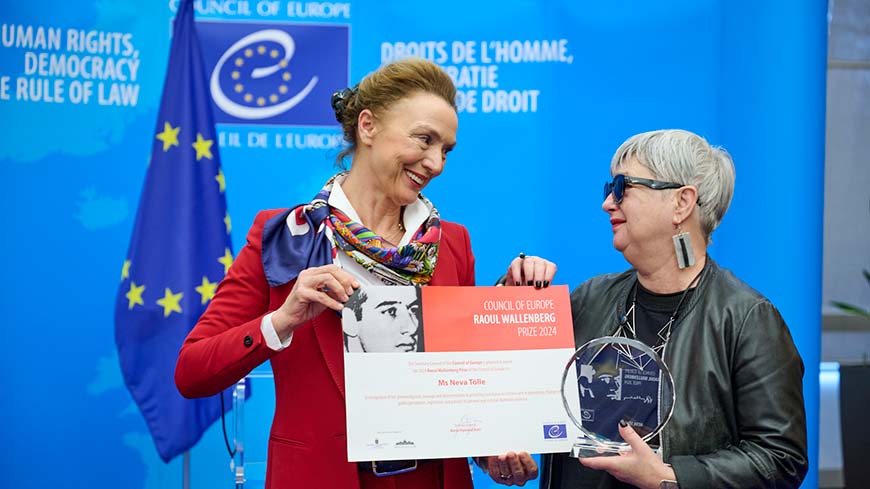Neva Tölle, a Croatian national who has spent almost her entire adult life working to protect women from domestic violence, has been awarded the Council of Europe’s Raoul Wallenberg Prize 2024 in recognition of her pioneering role, courage and determination in providing assistance to victims and in promoting change in public perception, legislation and policies to prevent and combat domestic violence. At the award ceremony in Strasbourg, the Secretary General of the Council of Europe, Marija Pejčinović Burić said “Action and dedication of this sort does not come without a price. Throughout the years, I know that you have experienced threats, intimidation and obstacles of many kinds. But you have persisted. Your courage and determination have helped those in great need and helped change public opinion and ensure better, just laws. You have quite literally saved lives.”
The Jury emphasised how Ms Tölle’s courage and determination, innovation and creativity have had a real and sustained impact, benefiting victims of domestic abuse. In addition to providing direct support to victims, she has also worked tirelessly - and successfully - to promote the introduction of legislative changes such as recognition of the crime of femicide, stricter penal policies and changes to the Social Welfare Act.
Receiving the Raoul Wallenberg Prize Neva Tölle said “this award is not only for me, it is also a recognition of women who have survived violence. They are my heroines and the inspiration that gives me strength every day. I consider myself privileged to have had the opportunity to be with them, listen to their stories and witness their incredible courage. It is not only a recognition of past efforts, but also a commitment to the future. I will continue to fight for women's human rights, promote justice and security, and together with you build a society where violence against women has no place.”
Speakers at the award ceremony included the Secretary General, Roderick Liddell, Chair of the Jury, the laureate, as well as Ambassador Robert Rydberg, Chargé d’affaires a.i., Permanent Representation of Sweden, and Ambassador Harry Rusz, Permanent Representative of Hungary to the Council of Europe.
17 January marks the anniversary of Raoul Wallenberg’s arrest in Budapest in 1945. The Swedish diplomat Raoul Wallenberg used his status to save tens of thousands of Jews from the Holocaust. His actions show that one person's courage and ability can really make a difference, offering inspiration to us all to speak out and indeed to act against persecution and xenophobia. His fate has remained an intriguing mystery for many years. Starting in 2014, at the initiative of the Swedish Government and the Hungarian Parliament, the Council of Europe created the Raoul Wallenberg Prize to keep the memory of his achievements alive. The Prize, worth €10,000, is awarded every two years in recognition of extraordinary humanitarian achievements by a single individual, a group of individuals or an organisation.
Former editions of the Prize recognised the achievements of Elmas Arus (2014), a young Roma film director from Turkey; the Greek association Agalià (2016) from the island of Lesvos; the Budapest-based European Roma Rights Centre (2018); a Syrian doctor, Amani Ballour (2020) and Vincent Raj Arokiasamy (2022), a defender of disadvantaged population of “untouchables” in India.
The jury consists of six independent persons with recognised moral standing in the field of human rights and humanitarian action, appointed by the Secretary General of the Council of Europe, the Swedish Ministry of Foreign Affairs, the municipality of Budapest, the Raoul Wallenberg Institute in Lund, the United Nations High Commissioner for Refugees (UNHCR) and the Raoul Wallenberg family.
Speech by the Secretary General





